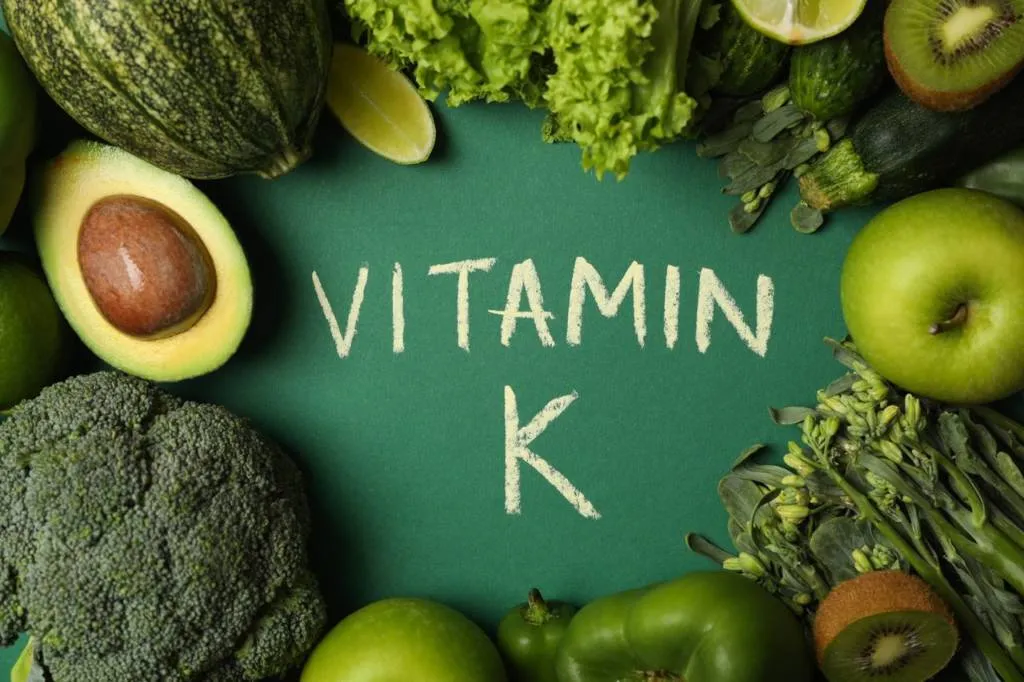Vitamin K is an essential nutrient that plays a crucial role in blood clotting, bone health, and heart health. It also has potential anti-inflammatory properties. Including vitamin K-rich foods like leafy greens, cruciferous vegetables, and fermented foods in your daily meals can help ensure an adequate intake. However, it’s important to be aware of potential interactions with medications. Consult with your healthcare provider to determine the recommended intake levels for vitamin K and to discuss any concerns or questions you may have.

Vitamin K Overview
Vitamin K is a fat-soluble vitamin that plays a crucial role in blood clotting, bone health, and heart health. There are two main forms of vitamin K: K1 (phylloquinone), found in leafy green vegetables, and K2 (menaquinone), found in animal products and fermented foods.
Health Benefits of Vitamin K
1. Blood Clotting: Vitamin K is essential for the production of proteins that help blood clot properly, preventing excessive bleeding and promoting wound healing.
2. Bone Health: Vitamin K plays a role in bone metabolism and mineralization, supporting bone strength and reducing the risk of fractures and osteoporosis.
3. Heart Health: Some studies suggest that Vitamin K may help reduce the risk of coronary heart disease by preventing the calcification of arteries and promoting vascular health.
Diseases and Conditions Benefited by Vitamin K
1. Haemorrhage and Excessive Bleeding: Vitamin K deficiency can lead to impaired blood clotting, increasing the risk of haemorrhage and excessive bleeding.
2. Osteoporosis and Bone Health Issues: Inadequate Vitamin K levels can compromise bone health, contributing to the development of osteoporosis and increasing the risk of fractures.
3. Cardiovascular Diseases: Some research indicates that Vitamin K may play a role in preventing the calcification of arteries and reducing the risk of coronary heart disease.
Recommended Dosage of Vitamin K
The recommended daily intake of Vitamin K varies depending on age, gender, and life stage:
- Infants (0-12 months): 2-2.5 mcg (micrograms)
- Children (1-3 years): 30-55 mcg
- Children (4-8 years): 55-60 mcg
- Children (9-13 years): 60-75 mcg
- Teens (14-18 years): 75-90 mcg for females, 120-150 mcg for males
- Adults (19 years and older): 90 mcg for females, 120 mcg for males
Food Sources of Vitamin K
1. Leafy Green Vegetables: Spinach, kale, collard greens, and Swiss chard are rich in Vitamin K
2. Broccoli and Brussels Sprouts: These cruciferous vegetables are good sources of Vitamin K1.
3. Animal Products: Liver, egg yolks, and some cheeses contain Vitamin K2.
4. Fermented Foods: Natto (fermented soybeans), sauerkraut, and certain cheeses are rich in Vitamin K2.
5. Oils: Certain oils like soybean, canola, and olive oil contain Vitamin K1.
Tips for Maximising Vitamin K Absorption:
– Pair with Healthy Fats: Since Vitamin K is fat-soluble, consuming it with healthy fats can enhance absorption. For example, adding avocado or olive oil to your salad can improve Vitamin K uptake.
– Cooking Methods: Lightly steaming or sautéing vegetables can help preserve Vitamin K content, while overcooking may lead to nutrient loss.
– Balance and Variety: Incorporating a mix of Vitamin K-rich foods into your diet ensures you’re getting a balanced intake of this essential nutrient.
In conclusion, Vitamin K is a vital nutrient with a range of health benefits, from supporting blood clotting and bone health to promoting heart health. By incorporating Vitamin K-rich foods into your diet and following the recommended dosage guidelines, you can support your overall health and well-being. Always consult with a healthcare professional before starting any supplementation regimen to ensure it’s appropriate for your individual needs.
